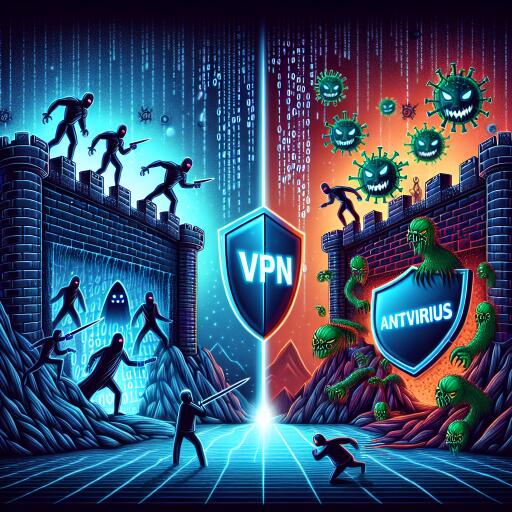Understanding the Critical Roles of VPNs and Antivirus Software in Cybersecurity
In today’s digital age, the internet offers a boundless universe for exploration, entertainment, and connection. Yet, this digital frontier is not without its perils. Cyberthreats, including data theft, fraud, and phishing, lurk in the shadows, ready to exploit any vulnerability. To combat these risks, robust security measures are indispensable. Among the leading solutions for protecting oneself online are VPNs (Virtual Private Networks) and antivirus software—both pillars of contemporary cybersecurity.
What is a VPN, and How Does It Work?
A VPN is a critical tool for enhancing online privacy and security. By routing your internet connection through a secure, encrypted tunnel, VPNs mask your IP address, making your online activities virtually untraceable. This technology offers numerous benefits, such as maintaining privacy, bypassing geographic restrictions, and securing data on public Wi-Fi networks. But does it offer the same protections as antivirus software?
The Purpose and Function of Antivirus Software
Conversely, antivirus software’s purpose lies in identifying, preventing, and eliminating malicious software, or malware. This includes a range of threats like viruses, worms, trojans, ransomware, and spyware. Through continuous scanning and monitoring, it seeks to shield your devices and data from cyber threats.
VPN vs. Antivirus: Understanding the Distinction
Though both aim to enhance user security, VPNs and antivirus software tackle different aspects of cybersecurity. VPNs focus primarily on securing and encrypting your online connections, enhancing privacy, and protecting data in transit. In contrast, antivirus software zeroes in on combating malware and cyber threats that jeopardize device integrity.
Can VPNs Protect Against Viruses?
While VPNs play a pivotal role in securing online activities through encryption, they are not a panacea for all forms of cyber threats. They can mitigate the risk of certain attacks, especially on insecure networks, by encrypting your data. Features like ad-blocking also help minimize exposure to malicious content. However, unlike antivirus software, VPNs are not designed to detect or remove malware from your device.
Limitations of VPNs in Cybersecurity
VPNs provide a significant layer of privacy and security by concealing your IP address and encrypting data transmissions. Yet, they cannot protect against malware, phishing, or direct attacks on stored data—areas where antivirus software excels.
The Importance of Combining Antivirus Software and VPNs
For comprehensive protection, employing both antivirus software and a VPN is highly recommended. While antivirus software guards your device against direct cyber threats, a VPN enhances your online anonymity and security, especially while accessing the internet over public Wi-Fi networks. Together, they offer a robust defense against a wide spectrum of cybersecurity challenges.
Making the Right Choice for Your Needs
Choosing between a VPN and antivirus software depends on your specific security needs. If enhancing online privacy, securing data transmissions, or bypassing geographic restrictions are your primary concerns, a VPN may be your best choice. Conversely, if protecting your device from malware and cyber threats is a priority, antivirus software should be your go-to solution.
For many users, the ideal strategy encompasses both technologies. Some products combine antivirus and VPN solutions, providing a comprehensive security suite to protect against a broad range of online threats.
Conclusion
Both VPNs and antivirus software play crucial roles in modern cybersecurity. While each has its distinct purpose and strengths, they complement each other to offer a more comprehensive protection strategy. Whether used individually or together, these technologies are essential tools for safeguarding your digital life against the ever-evolving landscape of cyber threats.









